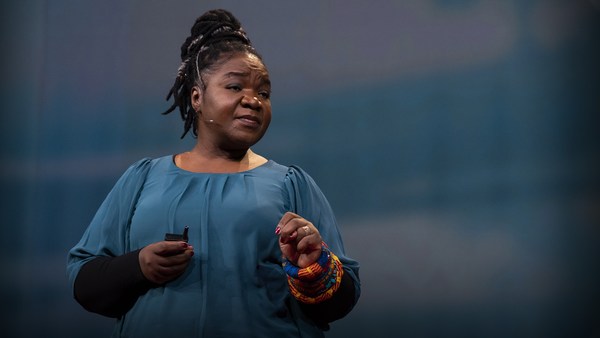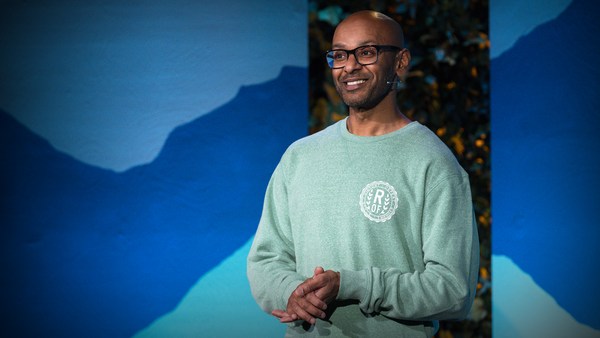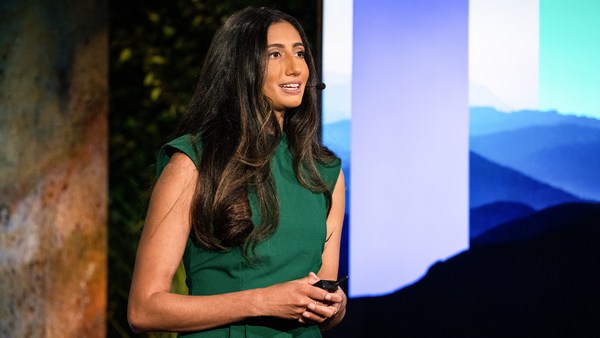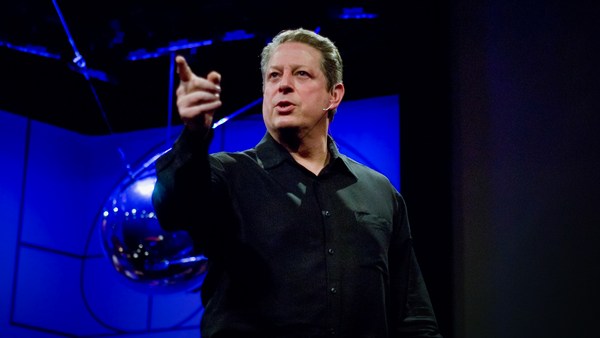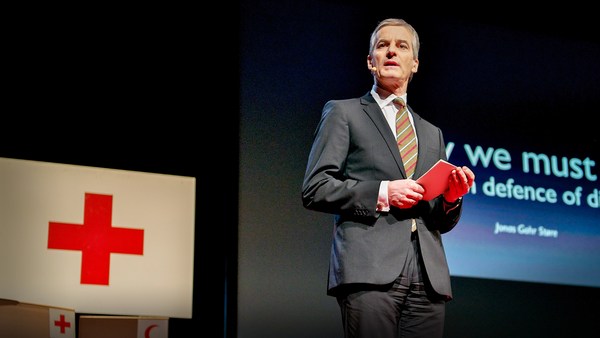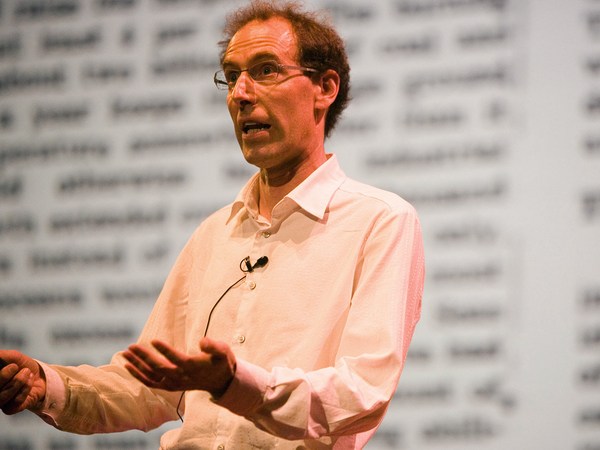The world today, it's no longer news that we are grappling with the devastating effects of climate change. Communities are searching for solutions, trying to turn the tide onto the future that at times really looks so depressing. And there is no place this is more real than in the continent of Africa.
But of course, conversations about climate change often miss out on accounting for the most critical barrier to climate solution, which is conflict.
I got to know about this through my personal experience as a survivor of war, but also working with a population that has been living through conflicts for years. If you may, I would love to share with you a story based on my personal encounter with the communities that I work with and who are going through the difficult times of climate change.
I'm from Uganda. Recently, in my home district of Lira, a woman was arrested because she had cut the shea trees and burned the charcoal into fuel. And it's a crime in Uganda. I saw her being walked to the police station, and I decided to ask her, said, “My sister, I see you are being taken, and you'll be charged for this crime. But I have a question for you. If you were forgiven for this crime today, do you promise that you will never do it again?"
The frustrated woman looked at me and told me and said, "You know what? Even if they release me right now, I would do it again. I would do it again, because only through burning charcoal that I can raise money to pay for my children's education. And it's only through burning charcoal that I can raise money to meet the medical bills for my children, who are always falling sick of malaria. So the truth is, I would do it again."
This is the story for many in Uganda. Beautiful country with so much potential, but always undermined by a near constant state of violent conflict. And you know, in a community where poverty and unemployment is so high, fighting against climate change is almost a losing battle.
But when you look through across Africa, you find that most of the countries most vulnerable to climate crisis are going through some sort of conflict. When you look through the Sahel region, you find there's always constant attack, clashes between the herding, the farming and the fishing communities over diminishing land and water resources. Of course, with not so much option, humanity will always do anything possible for survival. I remember this firsthand when I was growing up as a child in war zone in northern Uganda. I myself had to cut the trees, to burn charcoal, to raise money to meet the basic needs, but most importantly, to pay for my education. An education that has enabled me to be able to stand before you to give this speech today.
Now the big question is: How can we make it, what can we do to create an alternative to environmental destruction and provide economic means that will support conditions necessary for peace? That's the biggest question we should be asking ourselves today. I remember, I think about this a lot through my work at African Youth Initiative Network, AYINET, where for decades we have been supporting war survivors from Uganda, from Congo, from Sudan and South Sudan, and we've been able to mobilize young people to make them game changers for peace and development. We mediate in community conflicts and support agricultural activities as a mechanism to provide youth economic alternatives to violence. And we have been successful. So the success of this work we have done is a clear manifestation of how a local initiative can greatly impact on economic empowerment, on conflict resolution and on climate change. And every time I think about this, I do believe this is an opportunity for Africa to also impact on world peace.
And I sincerely know for sure that for us to achieve this goal, the following three points have always come very strongly in my heart. And the first is we need to change the way we're talking about climate change. It is time that we take the climate dialogue beyond just mere weather patterns and help people understand what they are fighting for, who they are protecting, what will they win or lose based on their action or inactions. This has always helped us. I remember early last year I went to my village with my twin brother, Jack. We were welcomed by one of the community elders, Charles. He was so happy to see us, to welcome us home, and he was sad that he couldn't give us some sugar cane, which used to be his traditional gift to us, simply because the wetland that used to grow sugar cane had dried up, and he was really sad about it. My twin brother comforted him and told him, “Weather is changing, weather would encourage us, let community do our part by planting trees so that we can attract more rain."
When he heard this, he asked my brother, said, “Mr. Opio, are you saying, as you are saying, trees is good to bring rain? Now that you have planted so many trees in your community, is it raining in your garden?"
To me, this was sincerely the most basic, important organic question that could come from this community. But also it made me reflect if, if at all, our global discussions about climate change is actually responding to the needs at the grassroots.
So, today, in northern Uganda, shea trees are no longer producing enough fruits because there's local knowledge that shea trees do need bush burning in order to stimulate flowering. But also, we know bush burning is bad for environment, creating a lot of confusion. And this brings in the issue that contradictory accounts from experts, from activists, from the government, which leaves the local communities as collateral victims of global disagreement. And this has kept every one of us in the merry-go-round of climate confusion.
Secondly ... We need to engage the population that is most affected, in this case, the young people, the youth. With 70 percent of Africa below the age of 30, youth represent the largest demographic opportunity for the continent. We have to engage, including youth, to be an opportunity to uplift the continent from the devastating poverty. And excluding young people in all the climate activities will benefit conflict. So we must engage young people. This is because we do know youth are the legitimate owners of the future, so their inclusion is mandatory.
And finally, as we seek to mitigate the effects of climate change and conflict, it is time to hold corporations, government and individuals accountable for committing climate crimes at home and abroad. This should be done by establishing International Climate Court. Today, the world is celebrating the transition to clean energy. We are celebrating the progress. But we cannot celebrate the transition to clean energy while being silent about the death and suffering of millions of people.
In Democratic Republic of Congo, for instance, populations have been displaced, millions have been killed, lost properties, just because companies or corporations are exploiting their natural resources. And we have seen also rebel groups fighting to take on the fertile lands, lands rich with minerals in the Democratic Republic of Congo. The truth is, the suffering, the death, the inhumanity we are seeing in Congo is a proof that the road to clean energy is so far the dirtiest road on the planet.
Of course, I'm also worried. I'm worried that the climate crisis will leave the world more divided, especially between the global North and the global South. I'm also worried that the rich and the poor will be divided. The rural and urban. Why? Because 10 percent of the world's wealthiest are discussing a reduction of global emissions by flying less. And yet, greater, poorer majority are dreaming for only the one-time opportunity to fly. And to them, all these climate regulations being proposed appear as an effort to reinforce the pre-existing inequality, which has always been meant to keep them poor. This is going to create the division.
Lastly, there is an African proverb by legendary South African musician, Lucky Dube, who sang the song that says: "The night is long for a hungry child." "The night is long for a hungry child." What an image. That child could have been your child. Think about that mom, that dad, who are powerlessly waiting for the morning, to try to get something for the child who can't sleep because he went to bed with empty stomach. If we have opportunity, we should have leadership that are willing to create conditions that will help build the community of tomorrow that our children can count on.
And lastly, may we realize that the birth of a new era would mean we must all understand that climate change and war are intertwined global long-term challenges. It will require all of us to work together and, most importantly, mobilize a generation that is so willing to defy violence and work for the good of all of us.
Apwoyo matek. Thank you very much.
(Applause)
